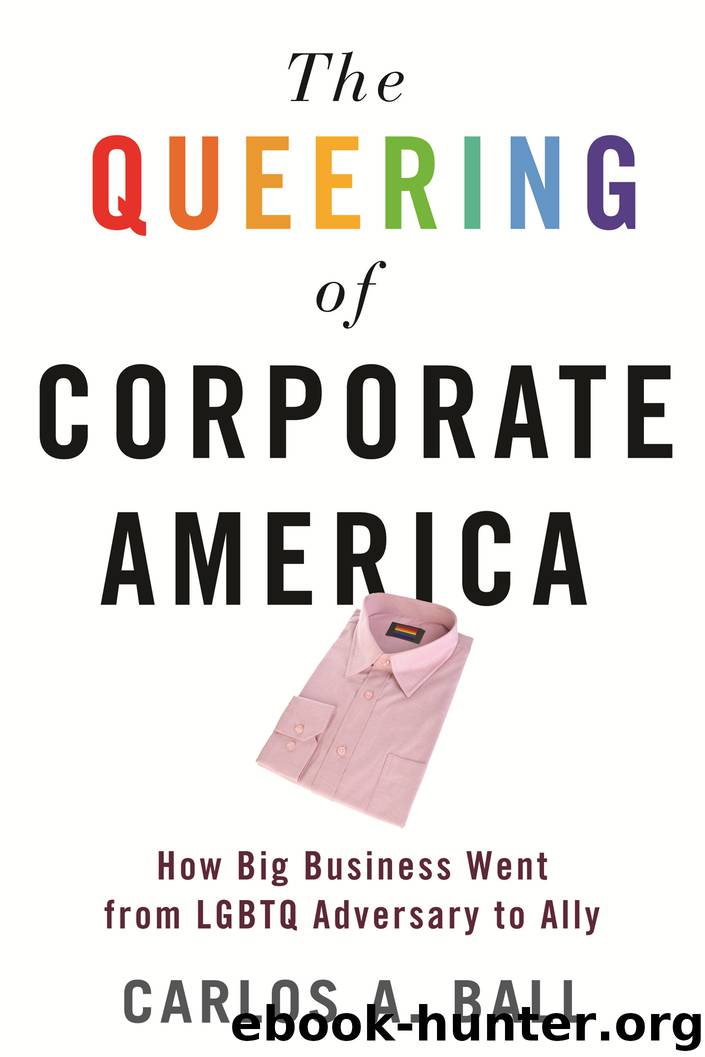The Queering of Corporate America by Carlos A. Ball

Author:Carlos A. Ball [Ball, Carlos A.]
Language: eng
Format: epub
Publisher: Beacon Press
CHAPTER 5
Corporate LGBTQ Advocacy in the Public Sphere
QUEER ACTIVISTS CONTINUED to pressure corporations to embrace LGBTQ rights positions well into the new century. A prominent example of that activism was the targeting of the Chick-fil-A restaurant company after its CEO stated in 2012 that “we are inviting God’s judgment on our nation when we shake our fist at Him and say, ‘We know better than you as to what constitutes a marriage.’” The executive added that his company supported traditional marriage and was “very much supportive of the . . . biblical definition of the family unit.” LGBTQ rights activists strongly criticized the CEO’s comments. They also held protests in front of company restaurants and called for a boycott. After only a few days, the company issued a statement asserting that “going forward, our intent is to leave the policy debate over same-sex marriage to the government and political arena.”1
Unlike Chick-fil-A’s new announced position of neutrality, many large companies increasingly refused to remain silent on government policies that affected the lives and rights of queer people. Indeed, the queering of corporate America took a new direction at around the turn of the century. Up until then, corporations had been almost exclusively the targets of LGBTQ rights activism as activists sought to influence their internal policies and practices; now, those same companies also increasingly became the sources of political activism on behalf of LGBTQ equality in the public sphere. As a general matter, the more corporations became internally committed to LGBTQ equality, the more they were willing to engage in external political advocacy on behalf of LGBTQ rights.
That external activism was manifested in the ways in which some large companies—at first only a few, but later many—pushed for laws at the federal, state, and local levels that protected individuals from discrimination on the basis of sexual orientation and gender identity. And, as the new century progressed, a growing number of companies started to advocate publicly on behalf of marriage equality.
Many corporations became public advocates for LGBTQ equality because doing so made a great deal of financial and business sense. But two additional (and related) factors also help explain corporate political advocacy on behalf of LGBTQ antidiscrimination laws and of marriage equality: First, the decades-long LGBTQ activism aimed at corporate practices helped turn several large firms from subjects of LGBTQ rights activism to sources of that activism; second, many high-level corporate executives became convinced that leaving public- and private-sector discrimination against queer people unaddressed, and the relationships and families of LGBTQ individuals unrecognized, was fundamentally inconsistent with their firms’ professed values of diversity, inclusion, and equality. In short, the corporations that engaged in political advocacy on behalf of LGBTQ rights did so for several reasons, including seeking financial rewards, responding to pressure by activists, and because they believed their corporate values demanded it.
It is important to note that corporate support for antidiscrimination laws and marriage equality were not the only ways in which corporations promoted LGBTQ visibility and causes in the public sphere.
Download
This site does not store any files on its server. We only index and link to content provided by other sites. Please contact the content providers to delete copyright contents if any and email us, we'll remove relevant links or contents immediately.
| African-American Studies | Asian American Studies |
| Disabled | Ethnic Studies |
| Hispanic American Studies | LGBT |
| Minority Studies | Native American Studies |
Cecilia; Or, Memoirs of an Heiress — Volume 1 by Fanny Burney(31322)
Cecilia; Or, Memoirs of an Heiress — Volume 3 by Fanny Burney(30928)
Cecilia; Or, Memoirs of an Heiress — Volume 2 by Fanny Burney(30885)
The Great Music City by Andrea Baker(21166)
We're Going to Need More Wine by Gabrielle Union(18064)
Bombshells: Glamour Girls of a Lifetime by Sullivan Steve(13100)
Pimp by Iceberg Slim(12922)
All the Missing Girls by Megan Miranda(12739)
Fifty Shades Freed by E L James(12443)
Norse Mythology by Gaiman Neil(11873)
Talking to Strangers by Malcolm Gladwell(11861)
Crazy Rich Asians by Kevin Kwan(8340)
Mindhunter: Inside the FBI's Elite Serial Crime Unit by John E. Douglas & Mark Olshaker(7827)
The Lost Art of Listening by Michael P. Nichols(6462)
Enlightenment Now: The Case for Reason, Science, Humanism, and Progress by Steven Pinker(6402)
Bad Blood by John Carreyrou(5761)
The Four Agreements by Don Miguel Ruiz(5502)
Weapons of Math Destruction by Cathy O'Neil(5029)
We Need to Talk by Celeste Headlee(4861)
